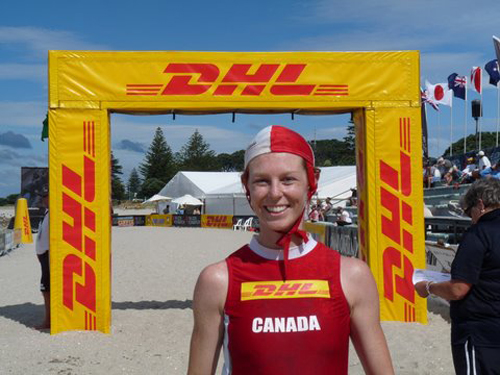
Emily Brady lies face down in the snow. At the signal, she leaps to her feet, turns and runs as fast as she can through the snowbank to pick up a piece of garden hose half buried in the fluffy white stuff.
Don’t recognize this as a winter sport? That’s because Brady, a master’s student in U of G’s public health program, has been training for a warm-weather sport: lifesaving. While some lifeguard competitions take place in a pool, Brady also enters those that are held on the beach. Because there aren’t many sandy beaches available for training during Ontario winters, she had little choice but to practise in the snow.
That cold-weather practice paid off for Brady when she was chosen as part of the Canadian team to compete in the New Zealand Northern Region championships and the International Surf Rescue Challenge, both held in Mt. Maunganui, NZ, in early February. “The competition was very tough because many of the other countries were in their peak season,” she says. “It’s also a much bigger sport in some places. In New Zealand and Australia, this is like hockey. The star competitors are on cereal boxes.”
Brady competed in two individual events and three team events. Her individual events were the 90-metre beach sprint ─ “It’s just running on the sand.” ─ and the beach flag event she had practised for in the snow. Beach flag is a bit like musical chairs but without the music. In this event, the female competitors start lying face down on the sand in a row, then turn around and run 20 metres to pick up the “flag” (actually, as in her practice sessions, a piece of garden hose). There will be one flag less than there are competitors, so one person is eliminated in each round. There’s a short break while the men do their first round, then the remaining female competitors lie down on the sand to start another round, and the process continues until a final winner is declared.
Brady was also a member of the Canadian relay team. One type of relay race includes swimming, paddleboarding, and surf skiing, with a beach sprint at the end. Brady had to meet the swimmer in the water and run up the beach to the finish. Another relay is four 90-metre laps of running on beach sand, with each runner passing the baton on to the next.
The competition took place over five days ─ three days of competition and two days to visit other parts of New Zealand. Brady had a chance to visit Hot Water Beach, where you can dig a hole in the beach at low tide, then let it fill with water as the tide comes in. Because of the geothermal activity just under the surface, the water will heat up. “It’s like sitting in a hot tub,” she says. She also visited Rotorua, where she was able to see geysers and caves lined with glow-worms. And she tried Zorbing, a sport where people roll down hill inside a kind of giant transparent plastic ball.
Brady became interested in working as a lifeguard when she was 16. “I loved swimming, so I decided to do the lifeguard training.” A year later, her boyfriend ─ now her fiancé ─ introduced her to the competitions. Originally from Ottawa, Brady is a member of the Ottawa Valley Lifesaving Club and coaches the U of G team; they placed 12th at the Ontario championships in March.
While competitors in Australia can earn significant amounts of money, Brady says that in Canada “it’s just for the glory.” She and her teammates paid their own way to New Zealand for the competition there. “There was a lot of fundraising,” she adds.
Competing against countries where the weather is warmer is tough, but Brady is pleased with her accomplishments. She placed third in the Northern Region championships and fifth in the International Surf Rescue Challenge. The Canadian team was last overall, but she’s not discouraged by that. “My goal is to go to the World Lifesaving Championship, which is held every two years,” she says. “Having this international experience will definitely help me prepare for that.”
She’s also hoping to see more U of G students join the lifesaving competitive team on campus, and encourages anyone interested to contact recreation supervisor Beth Fisher in the Department of Athletics at bfisher@uoguelph.ca.